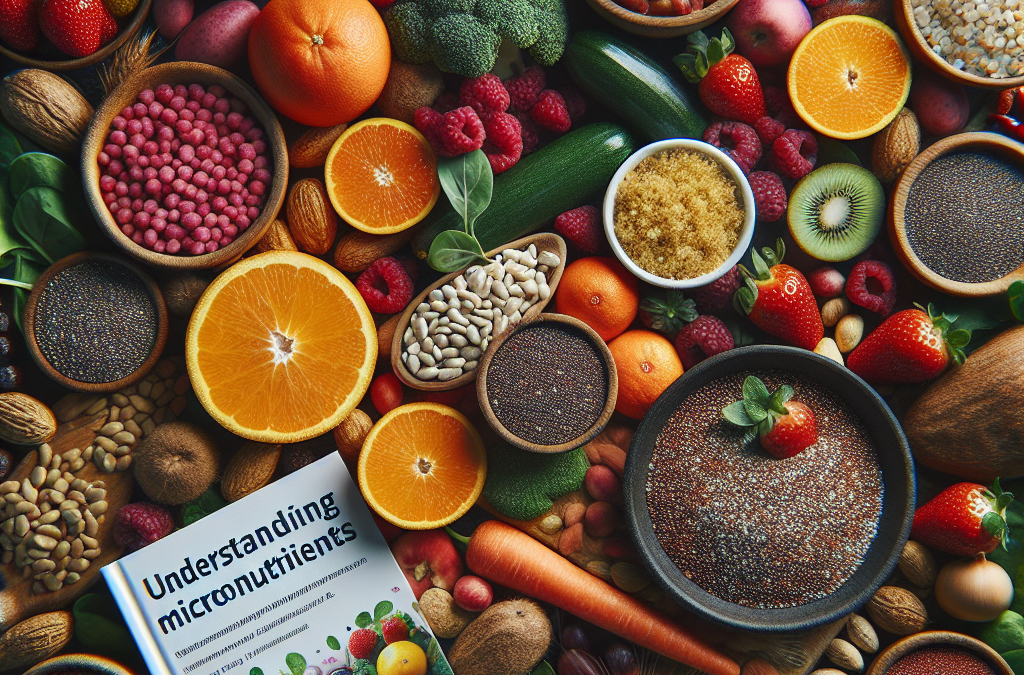The Importance of Micronutrients
What Are Micronutrients?
Micronutrients are the nutrients that our bodies need in smaller amounts, but don’t let the name fool you; they play massive roles in our overall health. These include vitamins and minerals that drive essential processes in our bodies. Think of them as the tiny powerhouses that fuel our everyday functions.
Vitamins often fall into two categories: fat-soluble (like A, D, E, K) and water-soluble (like B-complex and C). Minerals, on the other hand, can be trace minerals (like iron and zinc) or major minerals (like calcium and magnesium). Each has unique functions and requirements. Knowing the difference helps you target what your body really needs.
From keeping our immune system in check to aiding in energy production, these micronutrients are vital. For instance, vitamin C helps with iron absorption, while calcium is crucial for bone health. That’s why ensuring you get a balanced diet rich in micronutrients is more than just a good idea; it’s essential for thriving!
Sources of Micronutrients
Food Categories Loaded with Micronutrients
When it comes to sourcing micronutrients, our best bet is through a varied diet. Fruits and vegetables are your best friends here. Leafy greens like spinach and kale are packed with vitamins A, C, and K, while citrus fruits are famous for their vitamin C content.
Don’t overlook whole grains. Foods like quinoa and brown rice are not just filling; they’re also rich in B-vitamins and minerals. Plus, nuts and seeds provide a great source of healthy fats and micronutrients, like vitamin E and magnesium. The more colors on your plate, the better!
If you’re trying to focus on getting your micronutrients through food, think about integrating diverse cuisines into your meals. Traveling the world through your dinner plate might just help you hit all those essential vitamins and minerals without having to track them individually!
The Role of Micronutrients in Health
Boosting Immunity
One of my favorite aspects of micronutrients is their role in boosting immunity. When I’m feeling under the weather, I always turn to foods high in vitamin C—think oranges, bell peppers, and strawberries. Vitamin A also helps maintain the health of your skin and mucosal cells, acting as a barrier to infections.
Furthermore, zinc is a heavy hitter for immune function. It helps your body develop and activate T-lymphocytes, which are crucial for our immune response. Adding a zinc-rich food like chickpeas or pumpkin seeds into your diet can really pump up that immune system.
So, whenever flu season rolls around, I make it a point to stock up on immunity-boosting snacks and meals. It’s a proactive approach that not only helps me feel stronger but keeps colds and viruses at bay whenever possible!
Symptoms of Micronutrient Deficiencies
Spotting the Signs
Now onto the serious stuff—deficiencies. These sneaky little problems can manifest in ways we might not immediately connect to our nutrient intake. For instance, if you’re feeling fatigued or sluggish, it might not just be your busy life; it could be a sign of vitamin D deficiency.
Get an Amazing Discount on the Best Certified Organic Whole Food Supplement!
Another common issue is iron deficiency. A lack of iron can lead to those annoying feelings of weakness, especially during physical activities. Dark leafy greens, lean meats, and legumes can help address that, so don’t let those feelings go unchecked!
Sometimes, those symptoms can sneak by unnoticed or get misinterpreted. It’s essential to pay attention to your body and reflect on your eating habits. A quick check-in with a medical professional for a blood test can clarify if you’re deficient in any micronutrients.
How to Incorporate Micronutrients into Your Diet
Mindful Eating Habits
Alright, so how do we actually get these micronutrients on our plates? One way is through mindful eating. This means taking the time to prepare and appreciate your meals. Instead of grabbing a quick snack—reach for something colorful and nutrition-packed. A quick smoothie with spinach, banana, and a scoop of nut butter can be a delicious way to boost your micronutrients.
I’d also recommend planning your meals. Just spending a little time each week to think about what to cook can significantly help you ensure you’re getting a broad spectrum of nutrients. Consider incorporating one new vegetable or fruit each week—this keeps things interesting and beneficial!
Lastly, become a label reader! It sounds tedious, but getting in the habit of checking nutritional info helps to familiarize yourself with which foods pack more punches in micronutrient content. It’s easier than you think to bump up your intake with just a little knowledge!
FAQs about Micronutrients
1. What are micronutrients, and why are they important?
Micronutrients are vitamins and minerals that our bodies need in smaller amounts to function effectively. They support critical roles, such as boosting immunity, aiding in energy production, and maintaining bone health. Without them, our bodies can’t operate at their best.
2. How can I identify if I have a micronutrient deficiency?
Symptoms of deficiencies can vary but may include fatigue, weakness, or changes in skin health. If you’re experiencing unusual symptoms, it’s best to consult with a healthcare provider for a blood test that can identify specific deficiencies.
3. Can I get all micronutrients from supplements?
While supplements can help, it’s usually best to get your micronutrients from whole foods. A varied diet provides not only the essential vitamins and minerals but also fibers and other benefits that supplements may lack.
4. What are some nutrient-rich foods I can include in my diet?
Great options include fruits and vegetables like berries, leafy greens, nuts, seeds, whole grains, and lean proteins. Incorporating a variety of these foods will help ensure you’re getting a wide range of micronutrients.
5. How often should I monitor my micronutrient intake?
It’s a good idea to reflect on your nutrient intake regularly, maybe during your weekly meal prep. If you’re making changes to your diet or if you’re experiencing symptoms, checking in with a healthcare professional can help guide you.




